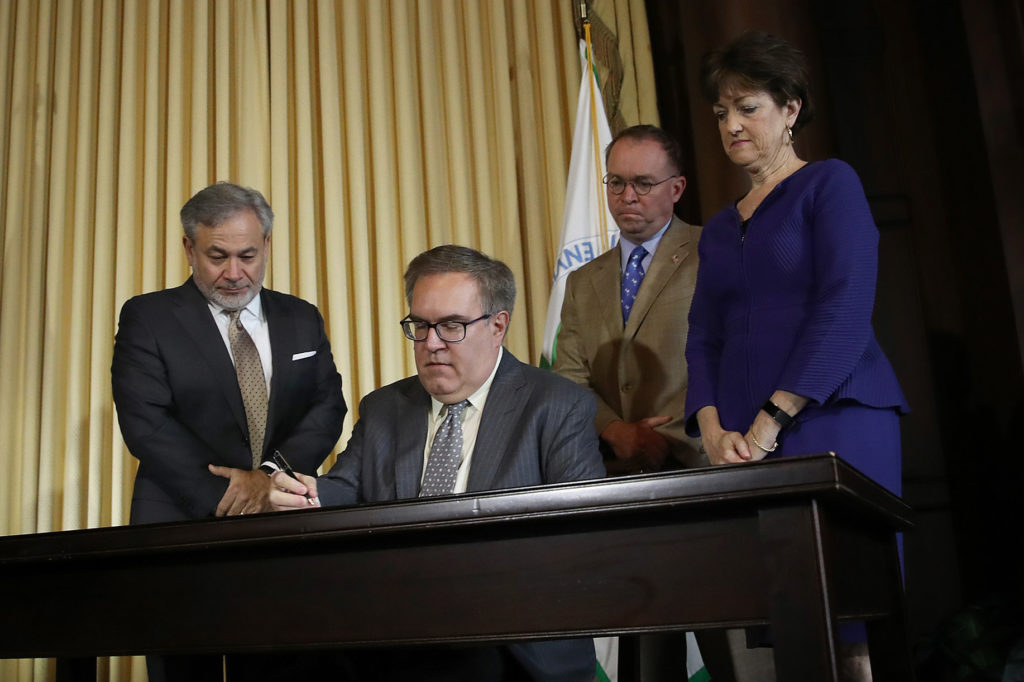
Electric cooperatives welcomed a final rule issued Wednesday by the Environmental Protection Agency that regulates carbon dioxide emissions from power plants without forcing the premature closure of coal-fired facilities.
EPA Administrator Andrew Wheeler signed the Affordable Clean Energy rule, which effectively repeals and replaces the 2015 Clean Power Plan. The CPP would have forced some utilities to switch from coal to lower-emitting fuels as a primary means of achieving deep cuts in CO2 emissions. That rule was stayed by the U.S. Supreme Court in 2016 and never took effect.
The ACE rule should largely prevent generation and transmission co-ops from being forced to prematurely shut down coal-fired plants, said Ted Cromwell, NRECA’s senior director of environmental issues. It also gives states more flexibility to work with individual co-ops to determine where action still needs to be taken in a cost-effective way, he said.
“The CPP was a broad overreach that we estimated could have resulted in $5 billion in increased costs for Basin and its members,” said Paul Sukut, CEO and general manager of Basin Electric Power Cooperative in Bismarck, North Dakota. “The ACE rule is more consistent with the EPA’s authority under the Clean Air Act and recognizes the role of states to work with utilities as they implement the rule.”
Basin Electric operates four coal-fired power facilities and powers other stations with wind and natural gas.
Patrick O’Loughlin, president and CEO of Ohio’s Electric Cooperatives, said Ohio’s co-ops support the final ACE rule, which he called “a return to a technically and legally reasonable approach to emissions reduction standards.”
“The ACE rule balances the need to broadly regulate emissions versus the specific emissions reductions that are possible at each facility by granting states the authority to create and administer rules for controlling coal-fired plant emissions,” he said.
“Further, the ACE rule will continue to lessen greenhouse gas emissions beyond the 28% by which emissions have already been reduced since 2005. ACE will require coal plants to run more efficiently by submitting and executing plans to improve plant power generation effectiveness. Finally, the ACE rule minimizes rate increases to co-op consumer-members.”
Leadership at Great River Energy, based in Maple Grove, Minnesota, also praised the final ACE rule, which will affect its two coal-fired power plants in central North Dakota.
“Great River Energy believes the ACE rule appropriately focuses on actions that can be taken at coal-fired power plants to improve efficiency and provides states with a key role in developing specific requirements for individual sources, both consistent with EPA’s authority under the Clean Air Act,” the co-op said in a statement.
“We also support the flexibility given to the states as they develop their implementation plans. Flexibility is critical in ensuring the lowest costs for complying with the rule and helping to ensure we can respond to market conditions, technology development and industry changes.”
The new rule does not change Great River Energy’s goal of achieving 50% renewable power by 2030, the co-op said.
Cromwell credited co-ops with helping convince the EPA to replace the Clean Power Plan with the more achievable rule. NRECA and its member cooperatives have been advocating that issue for years.
“NRECA appreciates the multiyear member advocacy efforts that led us to this point,” he said.
Co-ops have reduced carbon dioxide emissions by 12% since 2005 while increasing generation by more than 12 million megawatt-hours, according to figures by the EPA and the Energy Information Administration.
While co-ops continue to diversify their electric generation through greater use of natural gas and renewables, coal remains the largest source of fuel at more than 40%.
“Electric cooperatives have invested billions of dollars in diverse energy sources and emission-reduction technology to meet the electricity needs of their local communities while protecting the environment,” said NRECA CEO Jim Matheson.
While the new regulation will have a major impact on many co-ops, it won’t have much effect on those that have already moved away from coal, co-op leaders said.
“Our power supply mix has shifted away from coal and towards natural gas over the last number of years and will continue to do so as we start getting power from the new Vogtle nuclear units in 2021 and 2022,” said Ray Grinberg, CEO of Tri-County Electric Membership Corp. in Gray, Georgia.
Similarly, Holy Cross Energy in Glenwood Springs, Colorado, recently sold off the 60 megawatts of power it had been receiving from the Comanche 3 coal-fired plant near Pueblo.
“To the extent that the ACE rule fosters heat rate improvements on existing plants, it will have a positive effect on greenhouse emissions from coal plants in our region, in addition to the steps we have taken to replace our coal power supply altogether with increasingly cheaper wind and solar resources,” said Bryan Hannegan, the co-op’s president and CEO.
The new ACE rule will undoubtedly face court challenges in the coming months, Cromwell said.
Erin Kelly is a staff writer at NRECA.